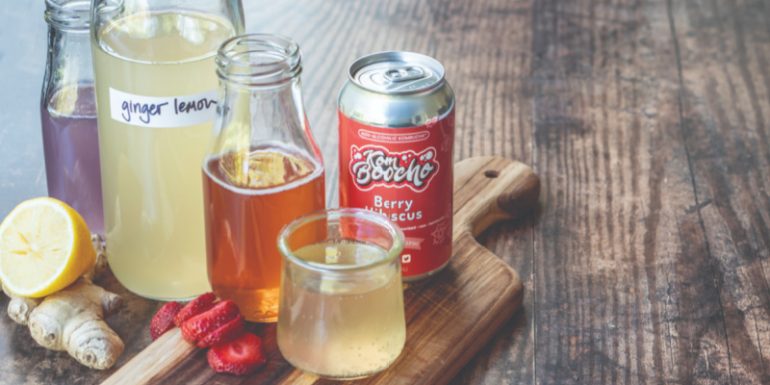By Shelby Deering | Photography By Holly Leitner
First came green tea. Then soy milk. Then smoothies, electrolyte water and aloe juice. In the arena of health-benefitting drinks, there always seems to be something new around the corner. Sometimes, these trends prove to be short-lived, and researchers find that the latest “wonder drink” doesn’t have as many health benefits as once thought. But occasionally, some health fads move beyond the trends and prove their staying power and real-deal benefits.
One of those promising trends is kombucha tea. Pronounced kuhm-boo-chuh, this healthy beverage can be found in many locations these days, from local supermarkets and health food stores to bars and restaurants, but many consumers are still discovering it for the first time.
WHAT IS KOMBUCHA?
Although kombucha has only recently gained widespread popularity in the U.S., the drink has been around for thousands of years. It’s believed that kombucha originated in China around 220 B.C., where it was praised for its healing properties. Since then, people have continued to brew kombucha at home for several centuries, and today it’s available on a commercial scale thanks to modern-day kombucha breweries.
So, what is kombucha exactly? Sam Schleiger, an integrative and functional medicine dietitian and the owner of Elkhorn-based private practice Simply Nourished, describes it as a fermented tea made from bacteria, yeast, sugar, and green or black tea. Kombucha’s main claim to fame is that it is highly probiotic — in other words, it’s full of beneficial bacteria. Studies show that probiotics can balance the digestive system, improve mental health conditions and even alleviate some digestive disorders. Schleiger calls this “supporting an optimal gut microbiome.”
The combination of bacteria and yeast in kombucha is known as SCOBY, which stands for “symbiotic culture of bacteria and yeast.” With this combination, and the addition of tea and sugar, the kombucha brewing process begins. Fermentation takes place over a week or more, during which time the live cultures metabolize the sugar and tea ingredients.
The result is a naturally carbonated beverage that contains beneficial vitamins and antioxidants. It can either be consumed “raw,” which enthusiasts believe is the healthiest form of the beverage, or it can be fermented for another round, in which fresh fruits, botanicals, vegetables and honey can be added as additional ingredients. And yes — the fermentation process does leave behind small traces of alcohol, but not enough to categorize it as an alcoholic beverage. Kombucha can carry a flavor that’s reminiscent of beer, but Doug Grall, owner and founder of Komboocho Brewing located in Whitewater, describes the taste as “tart, fizzy but still a little sweet.”
Schleiger narrows down the flavor profile even further, saying that kombucha offers “a slightly acidic, sour flavor” that will be “fizzy” when consumed—whichmeansyoushouldn’tshakethe container, just like a can of soda. Schleiger points out that the additional ingredients added for flavor can also offer additional health benefits. “Many brands of kombucha offer different ‘flavors’ where the basic ingredients will also include additions such as apples, mangoes, spirulina and others for added polyphenols [nutritious plant-based compounds], antioxidants and other beneficial properties,” she says.
Kombucha Brewers International reports that “sales [of] and access [to kombucha] have recently exploded, as kombucha has gone mainstream, with sales estimated at over $500 million.” The popularity of kombucha has grown rapidly over the past several years — some restaurants and bars have even starting crafting cocktails with it.
WHAT ARE THE HEALTH BENEFITS?
Kombucha Brewers International lists several possible health benefits of kombucha, referencing a nickname that the drink has had for centuries: the “elixir of life.” The organization cites kombucha drinkers who say that consuming the beverage:
- increases energy
- aids in digestion
- supports healthy liver function
- balances the internal pH
- controls hunger
- eases constipation
- boosts immunity
- enhances overall health and wellbeing
- makes the consumer just “feel good”
- lowers bad cholesterol and raises good cholesterol levels in the blood, which can significantly decrease the chances of developing heart disease and/or having a heart attack or stroke.
Scientific studies over the past 150 years have researched kombucha’s ability to combat high cholesterol, diabetes, toxins, free radicals and even cancer while supporting healthy liver function. Kombucha Brewers International says that the recommended serving size is “what feels good for your body,” and that those with specific health issues find that drinking small amounts of kombucha (around 4 to 8 ounces) one to three times a day may prove beneficial, though some enthusiasts drink much more kombucha in a day.
According to Schleiger, the science behind kombucha might just explain all the health benefits its supporters claim. She says that the body has about 100 trillion cells of bacteria and yeast that line the membranes of the mouth, skin and gut, comprising an astounding 3 to 5 pounds of living bacteria, which is also known as the microbiome. When the microbiome is balanced, it will produce serotonin and GABA, otherwise known as anti-anxiety neurotransmitters. It will regulate one’s stress response as well. Schleiger calls the gut “the second brain of the body,” since it’s directly connected to the nervous system of the brain and spine.
“When you can get the gut balanced, restored and flourishing,” she says, “you’re able to experience less bloating, less gastrointestinal disturbance, less inability to tolerate certain foods, improved regularity, clearer skin and you’ll find yourself generally ‘happier,’ among many, many other things.”
Although she points out the best way to achieve this balance is through a nutritious, whole-foods approach to your overall diet, Schleiger says that it’s key to include probiotic-rich foods, like kombucha, in your diet to “support the diversity of your gut microflora.” She adds that scientific evidence supports the idea that a diet rich in fermented foods and beverages — including kombucha but also sauerkraut, kefir, kimchi, yogurt and miso — provide the gut with excellent sources of beneficial bacteria. Also, since kombucha is made from green or black tea, consumers will also benefit from the “powerful antioxidants” in the tea.
As with any alternative health approach, experts say that kombucha’s benefits warrant further research, but many studies do point to kombucha’s potential health properties. At the same time, anyone with certain health conditions, especially digestive ones, should speak with a doctor before adding kombucha to their daily regimen. Schleiger says that even for those without health conditions, if you notice bloating or other digestive upset after consuming kombucha, it’s best to discontinue drinking it until you consult with your doctor. She adds that people with compromised immune systems or those who are pregnant will want to “proceed with caution” before drinking kombucha, since it does contain a small amount of alcohol.
For fans of kombucha, there are endless flavors to sample and increasingly creative recipes, including cocktails, baked goods and dressings — all of which come with the added benefits of potentially improving one’s health at the microbiome level. We’ll drink to that.
Kombucha Close to Home
In 2018, Doug Grall and Aaron Axelsen founded Komboocho Brewing in Whitewater, with the goal of supplying a healthy drink to Walworth County consumers and distributing one of the fastest-growing beverages in the United States. Komboocho specializes in crafting locally brewed kombucha using high- quality ingredients — Grall points out that they prefer to use locally sourced ingredients whenever possible. Some of their most popular flavors include Berry Hibiscus, Orange Blossom, Jasmine Peaflower and Elderberry.
Sporting pink, purple and orange hues, Komboocho’s Instagram-worthy bottles and cans ensure that shoppers can’t miss their bubbly, colorful branding. Grall says that he loves brewing kombucha in Whitewater because nearby Lake Geneva “is a progressive resort community with a sophisticated taste for unique beverages.” The company sells their kombucha beverages at local farmers’ markets in the spring, summer and fall, and shoppers can also purchase their drinks at local stores including the Cheese Box in Lake Geneva, Gooseberries Fresh Food Market in Burlington, the Whitewater City Market and Basics Cooperative Natural Foods in Janesville.
For true kombucha enthusiasts, Komboocho can even provide a kombucha keg to be served at events and parties. They say they also welcome new flavor ideas, which can be submitted through their website at komboocho.com.





